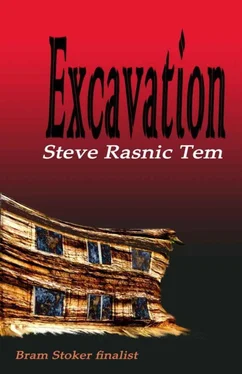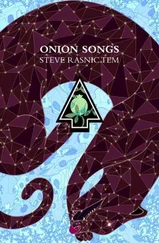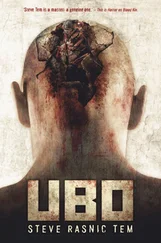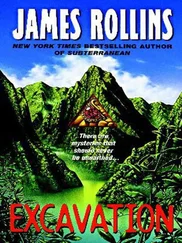Steve Tem - Excavation
Здесь есть возможность читать онлайн «Steve Tem - Excavation» весь текст электронной книги совершенно бесплатно (целиком полную версию без сокращений). В некоторых случаях можно слушать аудио, скачать через торрент в формате fb2 и присутствует краткое содержание. Год выпуска: 2010, ISBN: 2010, Издательство: Crossroad Press & Macabre Ink, Жанр: Ужасы и Мистика, на английском языке. Описание произведения, (предисловие) а так же отзывы посетителей доступны на портале библиотеки ЛибКат.
- Название:Excavation
- Автор:
- Издательство:Crossroad Press & Macabre Ink
- Жанр:
- Год:2010
- ISBN:978-1-452-38320-0
- Рейтинг книги:3 / 5. Голосов: 1
-
Избранное:Добавить в избранное
- Отзывы:
-
Ваша оценка:
- 60
- 1
- 2
- 3
- 4
- 5
Excavation: краткое содержание, описание и аннотация
Предлагаем к чтению аннотацию, описание, краткое содержание или предисловие (зависит от того, что написал сам автор книги «Excavation»). Если вы не нашли необходимую информацию о книге — напишите в комментариях, мы постараемся отыскать её.
Excavation — читать онлайн бесплатно полную книгу (весь текст) целиком
Ниже представлен текст книги, разбитый по страницам. Система сохранения места последней прочитанной страницы, позволяет с удобством читать онлайн бесплатно книгу «Excavation», без необходимости каждый раз заново искать на чём Вы остановились. Поставьте закладку, и сможете в любой момент перейти на страницу, на которой закончили чтение.
Интервал:
Закладка:
The men roared with laughter. Jake finally stopped tittering and said, “’Fraid I wouldn’t be as skillful with my hands in that situation as you were, Mr. Nickles.”
“I’ll lend you a gun, Jake,” Nickles said. “Providin’ you take care with it.”
“Oh, I sure will, Mr. Nickles! I dearly ’preciate it.”
Joe Manors sat up on the edge of his chair. “I’m not so sure that’s such a smart thing, fellas. That bear sounds like he’s gone crazy.”
“I’m afraid Jake and Mr. Nickles have the right idea this time, Joe,” Ben Taylor said. “If that animal has gone crazy, we’ve got to get rid of it quick.”
“I have to agree,” Charlie Simpson said quietly. And the decision was made.
By the time the sun set the men were on their way up the Big Andy. At about that same time Inez Pierce fell asleep on the floor beside her brother’s rocker.
Hector’s eyes were wide open. He was suddenly intensely aware of that fact, and that something seemed odd about the window. It was glowing.
He climbed effortlessly out of the rocker and approached the window. He touched the cool, glowing pane.
Then he opened it and climbed out.
Chapter 11
The train laid over in Four Corners for two and a half hours. It gave Reed more than ample time to walk around the town, have a bite to eat, and remember. Four Corners was the last “big” town—almost a thousand people—before the long trek up the ridges toward Simpson Creeks. It had two groceries, a drugstore, restaurants, hardware store, even two full-fledged department stores. When anyone in the Creeks or the surrounding area needed to buy something really major—usually once a year—they made the trip down to Four Corners. The round trip with shopping usually meant a full day’s excursion.
As he walked through the streets, it seemed the dust was getting to him rapidly—his eyes burning, throat parched, nose and nasal passages filled to discomfort. He was suffocating. And his body tense, like a caged tiger. He was burning to do something, anything. As he passed parked cars, he had the disturbing urge to smash windows.
Occasionally he would glance up at the surrounding hills, and they would look uncomfortably like the Big Andy Mountain. At any moment he expected to see people he hadn’t seen in ten years, crossing the street or turning a corner. Most of those people were dead.
Dead. It was hard to believe. As a child they’d all seemed immortal. His mother’s sensual magic, her power over his father. She didn’t always use it, didn’t always stop the rage, and that had made Reed resent her. Uncle Ben’s knowledge of the woods. His sister’s quiet magic—the magic of all young children, he supposed, with that imagined world they lived in. His father’s magic of rage that cast a spell on everything around him.
Reed had a hard time believing such rage could ever die.
His mother had bought him cowboy boots in the older of the two department stores in Four Corners when Reed had been ten. He was thrilled, and so nervous about scuffing them up he never wore them outside. He’d wear old shoes to school with the boots wrapped in paper under his arm, then change into them before class started, changing to the old shoes again when recess time came. That’s how he lost them; somebody stole the precious boots while he was outside playing.
Four Corners hadn’t changed much—the paint was clean and bright—and in that, Reed realized, it was very much unlike Simpson Creeks. In the Creeks people painted their houses and buildings but once every ten years or so. No one much cared. Amos Nickles usually had a well-painted house, but he was probably the only one.
Flowerbeds were well kept, and everyone appeared to have a garden. Every town family with a car. Very, very different from Simpson Creeks, he thought. In many ways Four Corners was the town the Creeks might have dreamed of being, if they’d cared that much.
Still, there were many similarities—the slow rhythm of the people’s speech, coupled with the long pauses between thoughts or between questions and replies that could drive an outsider half-crazy to listen to. The open friendliness with strangers who didn’t look too much out of the ordinary, which proved to be a thin veneer over a basic uneasiness with anyone from outside the community.
And the sense of there being a hard life out there, an existence barely won from nature, a momentary stay against danger.
At the Pork & Pie Restaurant the proprietor stared at him. Every time Reed looked back his way the man averted his eyes. Finally, he came over and smiled.
“Aren’t you the Taylor boy?”
“I guess… Reed Taylor is my name.”
The man beamed and grabbed his hand. “Your family had dinner here… oh maybe ten years ago. You ain’t changed much; just a little taller. And thinner… I’d say. Nice to see you again! Be in town long?”
Suddenly he was the Taylor boy again. He was the Taylor son. And once again, he was shy.
“No, I’ll be taking the train to the Creeks in about an hour.”
“Well, you say hello to your folks for me, will you? Tell ‘em we’d like to see ‘em again real soon!” The man smiled expectantly.
“Sure,” Reed said. “I’ll tell them… when I see them.”
The man looked at him oddly for a moment, then walked back to his kitchen, glancing at Reed’s table now and then, unsmiling.
Reed tried the soup and it seemed too cold; he tried a soft drink, with ice, and it burned going down. He started to choke, coughing into his napkin, and knew that the owner was trying not to notice. Reed caught the man spying on him once more—that look of complete suspicion—and he got up and left the restaurant.
So much for a homecoming…
Darkness fell swiftly in Four Corners; the mountains here were high on all sides, and cut off the sun’s rays early. It was already pretty dark an hour before Reed was supposed to get back on the train. He spent part of that time on a park bench near the courthouse watching two dogs struggle for a piece of scrap meat. They were small dogs, their fight a playful one, until one of them decided to go for the throat of the other. The black terrier’s neck suddenly spouted blood and Reed leaped to his feet.
The dog turned and snarled, would have had his right hand if Reed hadn’t jerked it out of the way. Reed shouted and kicked out at the dog, and it was gone around the corner of the courthouse.
He looked around. Several people watching him. Whispering. He tried to think it was because he was a stranger here, and of course people down here distrusted strangers.
They didn’t let anyone back on the train until fifteen minutes before departure. The conductor said they were cleaning, but Reed was unreasonably suspicious. Everything seemed suddenly awry, the town of Four Corners like his hometown of Simpson Creeks in one of his nightmares. Nearly dark and the minimal light distorted. As the sky grew darker and shadows blended, the edges of buildings began to waver and disappear. His fever grew worse; his head pounded. He walked to the train station and sat on a concrete loading platform in front of the train. He wanted to be as close as possible, the first one to leap aboard when the conductor granted permission. Two station hands eyed him from a freight doorway and he turned his head, told himself they weren’t looking. He coughed and his throat and mouth took fire in succession; he spat up a spot of darkness into the palm of his hand, and wiped it clean on his pants without checking to see what it was.
Finally the conductor stepped outside the train and waved. Relieved, he began to step up, then hesitated, suddenly afraid to go home.
Charlie could hear the hounds baying in the distance, their hollow voices distorted among the columns of trees and the rock abutments of this part of the Big Andy. It had been a long time since he’d been this high up on the mountain, not since he was a teenager in fact. The woods here were mostly conifers, more similar to woods up north than those lower down on Big Andy’s slopes. Remnants of that great forest that once covered the entire continent, Charlie knew. A dinosaur of a forest.
Читать дальшеИнтервал:
Закладка:
Похожие книги на «Excavation»
Представляем Вашему вниманию похожие книги на «Excavation» списком для выбора. Мы отобрали схожую по названию и смыслу литературу в надежде предоставить читателям больше вариантов отыскать новые, интересные, ещё непрочитанные произведения.
Обсуждение, отзывы о книге «Excavation» и просто собственные мнения читателей. Оставьте ваши комментарии, напишите, что Вы думаете о произведении, его смысле или главных героях. Укажите что конкретно понравилось, а что нет, и почему Вы так считаете.












